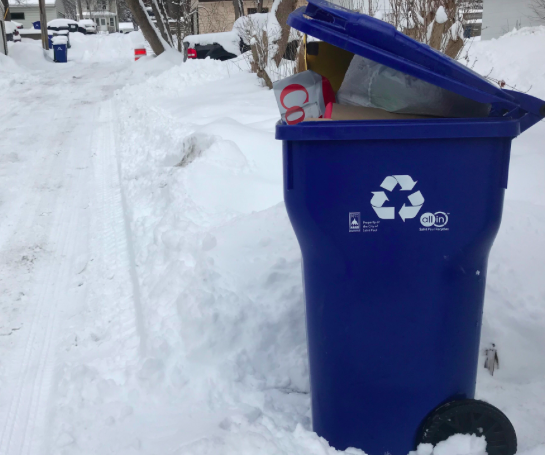In some St. Paul neighborhoods recycling was not picked up for up to three weeks because the trucks could not safely drive through icy and snowy alleys.

Last year Eureka Recycling, a nonprofit organization, partnered with the city to implement a service plan that would provide residents with recycling carts that could be collected in alleys.
Co-Presidents of Eureka Recycling Lynn Hoffman and Kate Davenport shared the company’s protocol for recyclables in alleys.
“We approach whether we go down the alley from a safety perspective,” Hoffman said. “When the alleys are extremely icy and dangerous we cannot send our trucks down not only to protect our drivers but the residents and their property.”
Though the trucks are big, Davenport said that the drivers have to take precaution because the vehicles are not fit to withstand some of the icy conditions of the pavement in the narrow alleyways.
Truck drivers make two attempts to go down the alley in one day, and if they are unable to get through, the city is notified. The city then sends a postcard to residents reminding them that it is their responsibility to clear the alleys. If the if the alley is not cleared by the next pick-up date, the city organizes a salt and plow vehicle to clear the area the following week.
To avoid the potential three-week process, residents are responsible for organizing plow and salt services in their neighborhoods. However, it can be tough to organize in areas of constant change like around St. Thomas’ college campus.
Junior and off-campus resident Michaela Minarik expressed her frustration with the pile-up of her recyclables throughout this winter season.
“The longest my house went without it being picked up was three weeks,” Minarik said. “We either just let it sit in the bin even if it’s overflowing, keep it inside or we will just throw our stuff away in the trash.”
The new carts have increased access to recycling for the community, making it more convenient for residents to dispose of their items. However, Hoffman emphasized the importance of remembering to pull the carts away from any obstructions so that the truck drivers can efficiently collect the recyclables.
“Particularly during the winter, the cart needs to be shoveled out. It cannot be on top of a snowbank or encased in snow and ice. There needs to be a clearance so that it can be picked up,” Hoffman said.
With attention to workers’ safety environment and easy accessibility of the carts for truck drivers, recycling can be picked up for more residents in a timely manner.
“We have seen increased participation with the roll out cart,” Hoffman said. “It has given access to recycling to more of the city and has helped those who were new to recycling or those who didn’t recycle much before get involved.”
Ava Diaz can be reached at diaz7981@stthomas.edu

